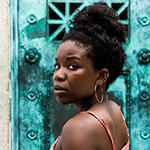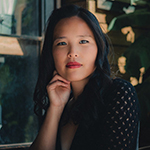Milk
It is in white spaces – the gallery, the museum, the university, the diploma, the page — that I begin to understand myself as an artist.
But it is in the dark that I understand what art is, or might be.
These are also the spaces that I began to understand myself as black.
Often these ideas — of white and dark, of light and black — seem in conflict.
Many of these conflicts seem oppositional or binary but many are unnamed, something else entirely.
In a darkened theater in Cambridge, Massachusetts I listened to the Lebanese artist Walid Raad tell a story where, in summary, a group of artists from the future send him messages of the names of various dead and lost artists.
(I am sorry that I don’t remember it as well as I should — I have decided not to let that stop me any longer.)
Raad first thinks he is crazy, that his mind is falling apart, but he eventually commits himself to writing the names streaming through his head in white vinyl letters on a white wall. Raad said: This is the only way an artist can come to understand things — shows them, and waits for people to tell him what it means.
People come to see this wall. No-one has any answers, except one cranky old journalist who says something like “You asshole, haven’t these people suffered enough? And him of all people.” The critic points at a name. “He does not deserve this!“ The man continues and tells Raad that these are artists of the past long forgotten for all the various reasons that have to do with class and religion and disability all those indexed reasons for why some people get written in and others do not. The critic takes a can of red spray paint and sprays the correct name on the wall, marking it like blood against a unnaturally sterile white surface.
At this moment, the voices cease. Raad knew that these artists from the future had got what they wanted. They made him do this the whole operation, the wall in the gallery, the misspelling so the critic would get angry and so that they could get this red. You see, they had lost the colour red in the future, lost access to it and they wanted it, desperately wanted it again.
I took two things from this story:
It is possible to spend your entire life searching for something that you miss.
That thing can be a color.
&
An artist shows things to others and waits for their responses
This is the only way an artist can come to understand the world.
I am thinking of making a painting and putting in a white space.
A white painting, maybe.
Milk paint is inexpensive and easy to make.
Martha Stewart tells me I will need:
a lemon, a quart skim milk, a sieve, a cheesecloth, dry color pigment or artists’ acrylic paint
She says to
1. Mix the juice of a lemon with 1 quart of skim milk in a large bowl. Leave the mixture overnight at room temperature to induce curdling.
2. Pour it through a sieve lined with cheesecloth to separate the solid curds from the liquid whey. Add 4 tablespoons of dry color pigment (available at art-supply stores) to the curd; be sure to wear a mask, and stir until the pigment is evenly dispersed.
I know from experience that this recipe is insufficient.
She has neglected to mention an important chemical — hydrated lime.
But I understand the aesthetic impulse: such simplicity is seductive, aspirational.
To think you could make full bodied-color from milk.
In practice, it produces a thin, sour and sickly whiteness.
milk (noun) an opaque white fluid rich in fat and protein, secreted by
female mammals for nourishment of their young
milk (verb) extract sap, venom or other substances from
To make a white bath for a cooling head, I was first instructed to use a combination of milks.
This instruction is not private — it came to me by paying for it, from two white women who, I see now, as more than their whiteness. I am no longer angry; but I was.
I told my mother later, angrily, “I should have not to pay for this information!”
She said only “I did not think I had to tell you such a common thing.”
You will need:
Coconut milk, goat’s milk, cow’s milk, white flowers (or lucky flowers of any
type), honey, cocoa butter, white soap, cascarilla, Florida water.
Mix this while in bath or shower in a bowl or bucket. Pour over the head.
Scrub self with white soap in a downward direction. Think of what you wish to clear.
After bath, soak skin with cocoa butter.
Take this residue and throw it at the crossroads, behind you.
If this is not possible, down the toilet.
An addition for clarity:
White candle, sharp smelling herbs. Light candle, breathe in.
Imagine a white veil or mist around you. Imagine smell making tear in veil. Continue tearing until reality seeps in. Resist the encroaching white.
If milk is not available, any white powder pasted to the skin and rubbed away will do. Scrub self with soap.
If you do not wish to through away the residue, put it all behind you, you may
produce your own milk and use it as you wish.
For self-milking:
retain bath water, particularly concentrate of flowers, milk and cascarilla.
If no bath, retain whatever residue is available.
Press the pulp in your hands.
You may spread veil of confusion or doubt.
You may use to encourage impossible empathy.
You may use to make them see what they say does not exist.
The residue can be used in whatever form is most convenient.
I imagine a choreography:
Milk rots. It is a horrible smell, says my mother, when it rots.
Milk is cleaned up immediately. We are forever predicting its spillage.
“Sit at the table!” “Sit upright.” “Be careful.”
It could happen at any time.
A woman is shot and her body remained in the street for observation for days.
A young man is covered over with police tape and cameras.
Deaths are notes in the middle of the newspaper, where the tourists will not
be deterred.
Fill a pool with milk. A pool: a tub. A pool: a hole in the ground, the pit of your stomach.
Bring friends who mourn the people who are now bodies, colors, flesh, smells.
Invite those who do not think they mourn, are simply haunted, see deaths on
a reel or a loop, cannot think to own this grief.
Take this bath together.
It may take a long time, possibly forever. You may never leave this bath.
It will become the world around you, a mist, a veil, although you do not understand
its source.
Scrub each other’s backs. The milk may rot. Dance in this congealed yellowing
mess.
Lie there.
Scrub.
Lay in the sun. Spread your legs with fat.
Take the residue and leave it at the prime minister’s house.
The president.
The mayor. Your neighbor.
The woman who laughed loudly during the film.
The people who seem to be just fine.
Anyone who says there’s nothing to do about it.
Watch them experience this.
The responses may be overwhelming, contradictory, in conflict, painful.
You may grow weary. There’s nothing to do, rings in your head.
Repeat this bath for yourself, in private, alone.
If you didn’t before, now you know what it means to wish for a cool head.
Author Statement
I embrace and trouble ambiguity and the in-between.This piece is part of a longer cross-genre piece – actively questioning the space between artistic disciplines, prose and poetry as well as the spectrum of positions of privilege, power and oppressions. It does not attempt to pinpoint or label, but to explore – with the perversity that it sometimes requires.The piece as a whole includes painting, performance and criticism, all revolving around differential aspects of material culture.
Katherine Agard is a writer from Trinidad and Tobago currently based in California. She travels frequently. Her writing has been supported by Lambda Literary, Kimbilio, Callaloo and VONA/Voices. She is currently an MFA student in Literature at the University the University of California – San Diego where she holds a residence in the Visual Arts Department. She writes and performs her relationship to color – material, socio-cultural, spiritual – and the language which allows us to perceive it.








